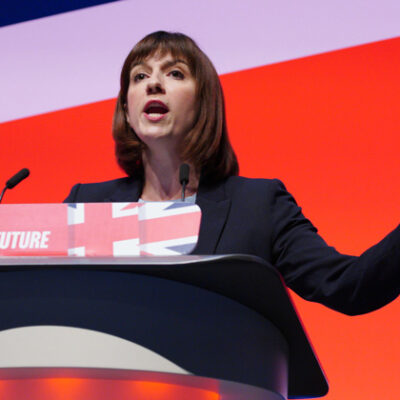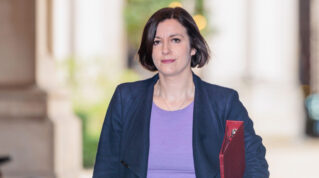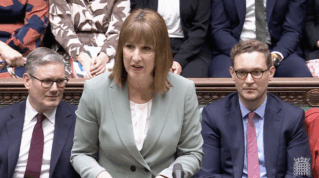Rishi Sunak will set an “ambition” for all students to study “some form of maths” until the age of 18.
But the prime minister will only commit to starting work to introduce the new policy in this Parliament.
He will acknowledge in a speech tomorrow that the proposed reform would not be achieved during the course of this Parliament – which will come to an end in 2024 at the latest.
The government also “does not envisage” making maths A-level compulsory for all students, Downing Street has said.
Ministers are “exploring existing routes”, such as the core maths qualification and T Levels, as well as “more innovative” choices, Number 10 said this evening.
But there are no details about how more maths teachers would be recruited. Government has failed to recruit the required number of maths teachers since at least 2012, Labour analysis shows.
‘Empty pledge without more maths teachers’
Shadow education secretary Bridget Phillipson said the prime minister “needs to show his working”.
“He cannot deliver this reheated, empty pledge without more maths teachers, yet the government has missed their target for new maths teachers year after year, with existing teachers leaving in their droves.”
Sunak pledged during the first Conservative leadership campaign this summer to introduce a “British baccalaureate”, which he said would also involve compulsory English study in sixth form.
However, his government has focused on maths since taking office in October.
In a speech setting out his priorities for the year ahead, Sunak will say the ambition is “personal for me”.
He will say “every opportunity I’ve had in life began with the education I was so fortunate to receive”. He attended prep school and then the private Winchester College, whose fees for boarders currently top £45,000 a year.
“And it’s the single most important reason why I came into politics: to give every child the highest possible standard of education.”
Ambition won’t be delivered before 2025
He will pay tribute to the “reforms we’ve introduced since 2010, and the hard work of so many excellent teachers, we’ve made incredible progress”.
“With the right plan – the right commitment to excellence – I see no reason why we cannot rival the best education systems in the world.”
The prime minister is expected to acknowledge the reforms won’t be easy, with Downing Street tonight admitting there are “practical challenges involved”.
Sunak is committing to starting the work to introduce maths to 18 in this Parliament, but not finishing it until the next.
The announcement will likely prompt scepticism about whether it will ever be realised, with the Conservatives mired in the polls.
Maths remains the most popular group of subjects at A-level, with just shy of 90,000 entries this summer.
But the government said only around half of 16 to 19-year-olds study any maths at all, warning the problem is “particularly acute for disadvantaged pupils”.
Downing Street also said the “majority” of OECD countries, including Australia, Canada, France, Germany, Finland, Japan, Norway and the USA, require some form of maths study to 18.
Sunak will say that “one of the biggest changes in mindset we need in education today is to reimagine our approach to numeracy.”
“Right now, just half of all 16–19-year-olds study any maths at all. Yet in a world where data is everywhere and statistics underpin every job, our children’s jobs will require more analytical skills than ever before.
“And letting our children out into the world without those skills, is letting our children down”.
Since 2014, all 16- to 19-year-olds without at least a grade C (now 4) in GCSE maths or English have had to continue studying these subjects alongside their main programme as a condition of funding.
But a DfE-commissioned review, led by Sir Adrian Smith in 2017, called for a rethink of this controversial resit policy and stopped short of recommending that everyone should continue to study maths until the age of 18.
Smith said today that the country needed to “upgrade the post-16 approach as part of wider reform at secondary and post-16”.
“It is time for a baccalaureate style system that will give a broader education than the exceptionally narrow A-levels.”
He added that “radical reform of the education system will not be easy and will take time but we need to get started now and build a cross party approach with support from teachers, students, parents and employers”.
“This matters too much to be a political football that could be punctured by the ebb and flow of politics.”
‘Show us the evidence’, says union boss

Geoff Barton, general secretary of the Association of School and College Lleaders, said it was “important that the government sets out the evidence for extending maths for all students to the age of 18 before embarking upon a significant change affecting future generations”.
“It may improve employability and the ability to cope with modern life, as the prime minister suggests, but it is important that this is based on solid research and is not a pet project.
“We would also want to hear how such a policy would avoid exacerbating the already-chronic national shortage of maths teachers.”
Barton acknowledged the current post-16 qualifications system “encourages students to specialise in a small number of subjects, and, in fact, government reforms in recent years have actually served to narrow the curriculum”.
“There is a strong argument for developing a system which allows for greater subject breadth tailored around the needs of the student rather than simply bolting on more maths.”

















Your thoughts